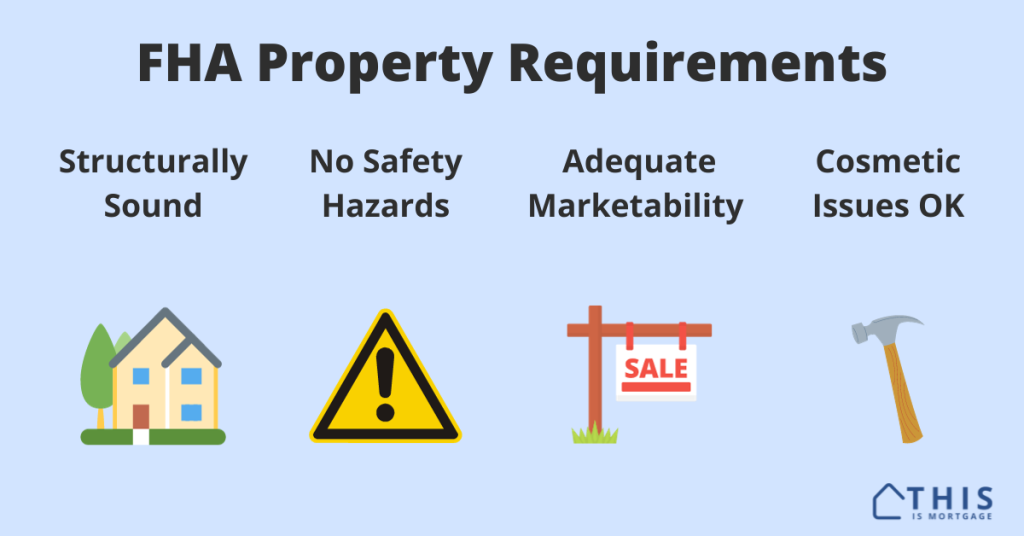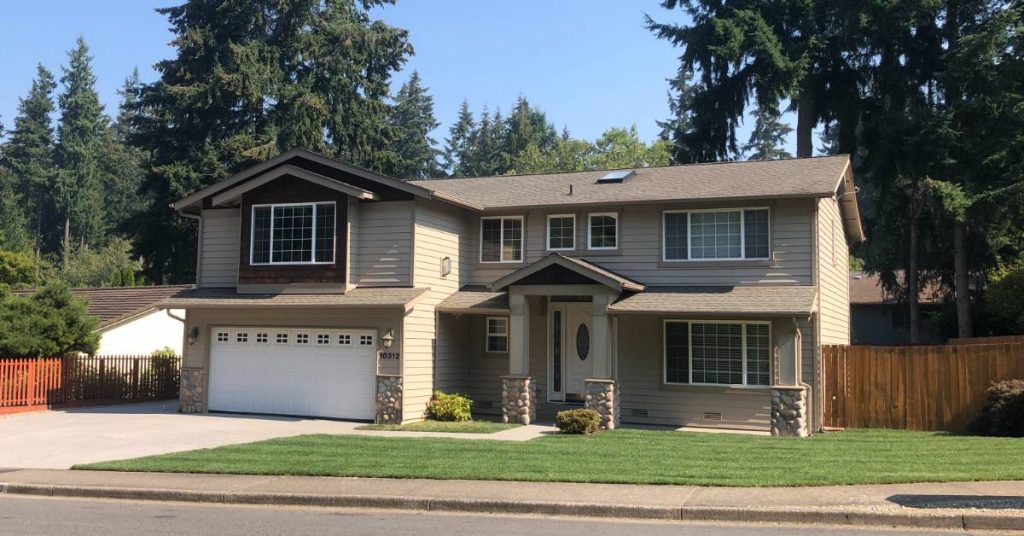Buyers and sellers alike experience undue angst about the FHA appraisal.
A commonly-held myth is that the FHA appraiser is on a mission to kill the sale. Or at the very least be overly nitpicky.
This isn’t the case. HUD, the overseer of FHA, wants to ensure a quality product for itself and the buyer.
As a seller or buyer, here are FHA property requirements to check before you have the appraiser come to the house. Plus, what to do if the house doesn’t “pass” the appraisal.
See if you are eligible to buy a home with FHA.
The site, property, and hazards
The location and property status can affect the appraisal. For instance, the appraiser must note heavy traffic or airport noise. The appraiser will comment on nearby gas lines, major power lines, storage tanks, or other hazards in the area. These won’t necessarily kill a deal, but the appraiser will estimate how they affect value.
Other site-specific characteristics include:
- Zoning
- Soil
- Drainage
- Oil wells within 75 feet
- Flood, coastal barrier, and lava zones
- Soil contamination
There’s not much to do about these issues, but it’s good to investigate how an FHA appraiser may handle them before making or accepting an offer with FHA financing.
Appliances & kitchen
Appliances must be operational unless they are not included in the sale (therefore not included in the home value). Test all appliances prior to the appraisal appointment.
Not every appliance is required, but the home must have a kitchen with a minimum of a stove hookup and sink with running water.
Paint
For homes built after 1978, the appraiser will report exposed surfaces on the home. This isn’t a safety issue since lead was not used during this time. Rather, non-painted surfaces are subject to decay.
However, for pre-1978 homes, the paint must be repaired, typically by brushing off flaking paint and re-painting the surface. The entire house may need new paint if paint damage is over the entire surface. Read more about peeling paint on pre-1978 homes and how you can speed the process of repairing it.
Check your eligibility for an FHA loan.
Plumbing/HVAC/electrical
Utilities: Make sure all utilities are turned on for the appraisal appointment. If not, the appraiser will need to re-inspect the home later, requiring extra time and cost.
Plumbing: The appraiser will run faucets and flush toilets. He or she will require an inspection for non-working items. The water heater must have a pressure-release valve.
Heating: The heat source must automatically maintain the living area at 50 degrees or warmer to prevent components from freezing. It also must keep the living space at a comfortable temperature without constant intervention. The primary heat source can’t be a wood stove, for instance. Also, the fuel source must be readily available in the area.
Air conditioning: Not required but must be operational if installed.
Electrical: Fix frayed wiring and non-working lights and outlets. The appraiser will randomly test these throughout the house. He or she will also examine the electrical panel to see if amperage appears adequate for the home.
Roof & attic
The roof must have two years of life remaining, according to the appraiser’s visual estimation. If you’re the seller, clear the roof of debris. The appraiser is more likely to require a roof inspection if he or she can’t see the surface.
The appraiser also needs attic access to look for signs of mold, bad ventilation, or water infiltration. Typically this only involves the appraiser looking into the attic access, not maneuvering around the attic.
Foundation & structural issues
The appraiser will comment on needed foundation repairs and may call for additional inspections. Basements must be dry and free of obvious structural issues. Other visible problems like bowing beams will be called out on the appraisal. The home’s structure must be able to last the entire loan term, typically 30 years.
Crawl space
The appraiser will comment on excessive dampness, mold, or other issues observable from a basic peek into the crawl space. Like the attic, the appraiser isn’t going to crawl around the area. A crawl space that isn’t safely accessible may require an inspection by a professional.
Sump pumps must be operational and can be hard-wired or connected to an outlet with a factory electrical cord.
Septic system
Septic systems are allowed but must be in working order according to a visual assessment by the appraiser.
Square footage
FHA does not state a minimum square footage for site-built homes. Guidelines state there must be “adequate space for healthful and comfortable living conditions,” so there is some interpretation left up to the appraiser.
Additions and garage conversion square footage can be included in total square footage if they are accessible from the main home, have a heat source, and is similar in quality and design to the home.
Manufactured homes must be 400 square feet.
Swimming pools
Swimming pools must be clean and operational to receive full market value, unless winterized. The appraiser will note structural damage that could require repairs. In some cases, the pool should be permanently filled in and graded to match surroundings to avoid expensive repairs.
Lead, meth & termites
While this would be a great band name, these are actually three risks that HUD groups together in its guide.
Lead: Any damaged paint in a pre-1978 home must be scraped and repainted due to lead poisoning risk.
Meth: A home with evidence of meth use or manufacturing must be deemed safe by a certified hygienist. Even if the property is deemed safe, the appraiser must note whether the stigma of being a “meth house” will affect value.
Termites: Compared to meth users, termites are a welcome problem. Evidence of termite or pest damage will require an inspection by a qualified professional even if treatment has occurred in the past.
Cosmetic issues
Typically, cosmetic issues do not need to be repaired prior to closing. The appraiser will note the affect on the property’s value. Sellers who are concerned that the property won’t appraise for the sales price should perform low-cost cosmetic repairs prior to the appraisal inspection.
Can you sum it up for me?
Any safety issue or high-cost repair won’t pass the FHA appraisal.
This logic makes sense for FHA. One of the agency’s goals is to provide safe and affordable housing. If the buyer gets hurt due to faulty electricity or a missing deck, FHA didn’t accomplish its goal.
But you also have to consider the buyer’s finances. Most buyers don’t have much in savings for a year or two after closing. They just sunk everything they had into the down payment and closing costs. Getting hit with a $20,000 repair bill could jeopardize loan repayment and force foreclosure.
Can the buyer make repairs?
Typically, it’s not wise for the buyer to make repairs before closing. This is a liability risk for the seller, but also a risk for the buyer if they do the work then the transaction does not close.
There are, however, two ways to complete repairs after closing.
- Repair escrow: Some lenders allow the buyer to include up to $5,000 in an escrow account to complete small repairs after closing. This is a simple and nearly painless solution for the seller, but only works for very minor issues.
- 203k loan: For repairs over $5,000, the buyer can finance repairs or even cosmetic renovation after closing using the FHA 203k loan.
Start your FHA Repair Escrow or 203k loan.
No need to fear the FHA appraisal
Quality homes will pass the FHA appraisal with flying colors. Inspections and repair requirements are less common than most buyers and sellers think.




